What is Agritourism?
'Agritourism' as the word reflects means tourism which is based around agricultural and horticultural activities which the visitors to a farm can enjoy and participate in. This niche tourism was started mainly with the idea of letting people from cities and towns enjoy and experience life on a rural farm or a ranch. This kind of tourism is very popular in USA, Europe and elsewhere in the world and was developed in India only in the last few years or so, and is now steadily gaining ground in India in terms of populairty.
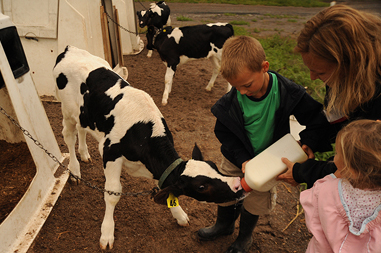
The purpose of agritourism is not just to allow visitors from city enjoy the rural life, but also as a means to bring the consumers closer to the farmers thereby eliminating the need for middlemen. The visitors to the farms, orchards, ranches etc. are encouraged to buy the local produce such as organic grains, fruits, vegetables, spices and condiments etc.
Life in any metropolitan or big city has now become too mechanical and robotic. The present generation children are now too much exposed to technology such as computers, mobile phones, video games, playstations etc. but many sadly have never seen a duck or a pig or even a cow in their life. Adults equally are too busy conducting their life around tightly-maintained schedules of office, meetings, conferences etc. Technology was supposed to have eased the life of a common man, and it has to some extent, but at the same time, the gap between man and nature has widened to such extent that many have forgotten the pleasures of the feel of soft, damp soil on their fingers, or the sweet scent of earth after the early summer showers in May and June. It has also become difficult to breath clean, pure air in a city, everywhere there is smoke, or industrial smog in the air. Many of us are therefore longing to go back in the lap of nature, if not for ever, then at least for a day or two, to be able to just breath normally without the smell of smoke or toxic fumes expelled by the vehicles. This need, to be free from the travails of life in a fast lane led to development of activities that would help people connect with nature and enable them to experience what life is alla bout without the technology.
Agritourism has many forms ranging from actual stays at a farm or a ranch, picking fruits during the harvesting season, picking corn, participating in ploughing of fields, sowing seeds, feeding animals, milking cows etc. Each farm may have its own USP with regards to the activities one can participate in. In this article, I have highlighted a number of such activities that are being offered by various farms within Maharashtra.
Farm Stay in Baramati
 Developed by the Agritourism Development Corporation, this is spread on a land of 110 acres on Bhigwan Road, Baramati. There are several kinds of crops that are grown in these lands along with many fruit orchards and other farming-related activities that the tourists can firsthand. A lot of traditional games and activities are organzied here for the tourists to participate in including riding a farm tractor and bullockcarts, ploughing fields with help of the bullocks. Traditional rural games such as Gilli-Danda, marbles, sur-paarambya (swinging from the aerial roots of huge banyan trees), kabaddi, langadi, kho-kho, lagori (sometimes called pitthu) etc. are some exciting games that can be played here. Opportunities to see local weekly markets, festival celebrations and village fairs etc are also provided. Arrangements are also made to watch traditional Maharashtrian religious ritual singings called Jagran-Gondhal and Bharud.
Developed by the Agritourism Development Corporation, this is spread on a land of 110 acres on Bhigwan Road, Baramati. There are several kinds of crops that are grown in these lands along with many fruit orchards and other farming-related activities that the tourists can firsthand. A lot of traditional games and activities are organzied here for the tourists to participate in including riding a farm tractor and bullockcarts, ploughing fields with help of the bullocks. Traditional rural games such as Gilli-Danda, marbles, sur-paarambya (swinging from the aerial roots of huge banyan trees), kabaddi, langadi, kho-kho, lagori (sometimes called pitthu) etc. are some exciting games that can be played here. Opportunities to see local weekly markets, festival celebrations and village fairs etc are also provided. Arrangements are also made to watch traditional Maharashtrian religious ritual singings called Jagran-Gondhal and Bharud.
There is an excellent arrangement for living and meals here with accommodation of upto 150 people at the same time. Ideal for school trips, agricultural research tours as well as family outings, this place must be visited at least once to enjoy and experience how life on a farm is all about.
Nearby places worth visiting are Ganpati temple at Morgaon (one of the Ashtavinayakas), Purandar Fort, Jejuri, Sopankaka Samadhi and Kanifnath Samadhi, and Supa Wildlife Sanctuary.
Strawberry Picking In Mahabaleshwar
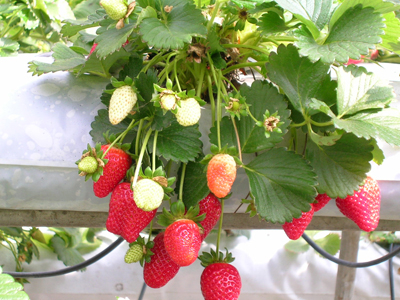
Accomodations are arranged for in some farms with arrangements fo upto 15 people at a time with breakfast and meals provided. Besides, there are a large number of hitels one can choose from in Mahabaleshwar and in Panchgani.
Mahabaleshwar is a hill station blessed with lush greenery all around and there are many spectacular points that are a must-see. Old Mahabaleshwar has an ancient temple dedicated to Lord Shiva, the sangam of five rivers, famous Mapro farms etc. Venna Lake in Mahabaleshwar offers great boating experience. Also, the tableland of Panchgani is quite nearby. Other places that should be visited while in Mahabaleshwar are Koyna dam (22 km), Dhom Dam (12 km), where boating can enjoyed, Ganpati Mandir of Wai, Pratapgad (20 km) the fort where the famous historical event wherein Shivaji Maharaj killed the tyrannical Afzal Khan - much-feared senapati at the court of Aurangzeb, took place. Wai is called as 'Dakshin Ganga' and iis known foir beautiful ancient ghats and temples on the bank of River Krishna. These ghats are a popular location for Bollywood movies and can be seen in films like Gangajal, Omkara, Dabbang, Swadesh, Ishqiya, Singham, Deool, Bol Bachchan, and many others.
Another great place to go strawberry picking is Tapola, only 25 kilometres drive from Mahabaleshwar. This breathtakingly beautiful place has been dubbed as 'Mini Kashmir' - with splendid 360 degree view of the Rivers Koyna and Solshi, Sahyadri Hills,and lush green dense forests. Another unusual activity that one can indulge in at Tapola is mud bath, which is a very enjoyable and fun experience and at the same time soothing and healing for your mind and body. There are some emu farms also present in Tapola where one can see and even touch the emu birds.
Mahabaleshwar and Tapola are situated atop the Sahydari ranges and are virtual paradise for trekkers and mountaineers with plenty of trekking and rigorous climbing to look forward to. This region is also abundant in a multitude of species of flora and fauna and is a birdwatcher's paradise.
Experiencing the Tribal Life in Thane
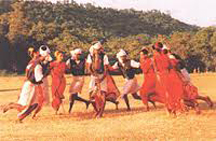 Thane district in Maharashtra is located in close proximity to Mumbai at its North-Eastern end, and is one of the oldest cities in India dating back to more than 2000 years. Thane is home to the famous tribe Warli, known for their typically beautiful Warli paintings - graphic designs created in white on red background. Thane is a beautiful place with a large number of lakes, scenic beaches and lush green hills and mountains. Many local landowners have now opened their doors to the tourists with the objective of making them familiar with the tribal life - their culture, their dances and festivals, their beautiful paintings etc.
Thane district in Maharashtra is located in close proximity to Mumbai at its North-Eastern end, and is one of the oldest cities in India dating back to more than 2000 years. Thane is home to the famous tribe Warli, known for their typically beautiful Warli paintings - graphic designs created in white on red background. Thane is a beautiful place with a large number of lakes, scenic beaches and lush green hills and mountains. Many local landowners have now opened their doors to the tourists with the objective of making them familiar with the tribal life - their culture, their dances and festivals, their beautiful paintings etc.
Mango Season in Konkan
Konkan, the coastal belt of Maharashtra is famous the world over as the largest producer of the king of all fruits - the extremely delicious and beautiful Alphonso mango, called 'Hapus Amba' in Marathi. Many mango growers have now started organizing Aamras Party in their orchards during the summer season. The tourists can explore the lush mango orchards, select their own fruits and buy directly from the farmers. They can also indulge in simple, yet delicious meals containing Aamras- polis (mango pulp with chapatis). Besides mangoes, karvanda or karonda, jackfruit, kokum etc. are also harvested around the same time and the tourists can relish them as well.
There are also a number of spice plantations in Konkan where cardamom, pepper, nutmeg, all-spices etc. are grown. One can also explore these plantations and buy the fresh spices. Konkan is also a large produce of the betel nut or the areca nut and these trees are found in alost every farm in Konkan.
Hurda Party
My article on agritourism would be incomplete if I did not mention the 'hurda party' that takes place on several farms all over Maharashtra during the winter season. Hurda is nothing but tender, green jowar or sorghum. The tender green stalks are picked and slowly roasted over open pitfires. The hot stalks are then rubbed with palms to remove the grains. This is called hurda which is served along with fresh, creamy curds, garlic chutney, raw onion slices and lemon juice. This does sound very very simple and rustic, but the moment you put a spoonful of this preparation in your mouth, you will only want more and more. The fires over which the sorghum stalks are roasted are fired by dried cow dung cakes, which give a typical, earthy, smoky flavour to the hurda. Jowar or sorghum is a staple food of most of rural Maharashtra and the farms where one can enjoy the heavenly experience of hurda are plentiful in the state! With the hurda, one has to have a glass of freshly pressed sugarcane juice or jaggery.
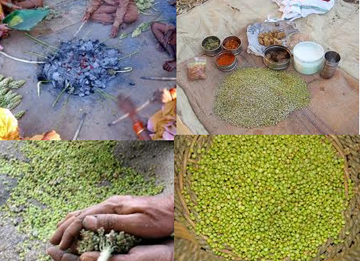
The meals that are served in most of these places are typically Maharashtrian meals comprising of pithala-bhakari or bharit-bhakari, mirchi cha thecha, rice, dal, and a smashed onion - that is right not sliced, but smashed with your fist - the flavour is unique! This sounds very simple, but the taste of it all is totally yummy and delicious.
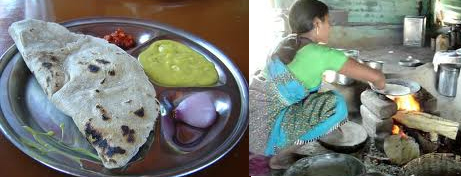
Most of the destinations offer weekend packages as well as day packages too. Apart from the above-mentioned places there many farms in and around Mumbai, Pune, Kolhapur, Solapur etc. where one can spend a day in the rustic idyllic surroundings where you can listen to bird songs instead of car horns and buzz of mobiles and computers. Many farms also offer special monsoon packages where one can enjoy and soak in the rains that are free from any kind of pollution or yucky slush that is associated with rains in the cities.
Great Learning Experience For All Ages
Besides being enjoyable, these type of sojourns are also a great learning experience, especially for children, since they can see the diversity of farm and other applied activities such as poultry farming, bee keeping, livestock maintenance, sheep rearing and shearing, emu farming etc. They also can see and learn how bio-gas is made from organic and farm waste, vermiculture and compost manure pits, processing of milk, fruits, vegetables etc. to manufacture different products. These enrich their knowledge and also help them in their school-related prodjects and science experiments. The children also get a better knowledge about the geography of the land, the various fragile yet, complex ecosystems, about the seasons and the crop cycles etc. by seeing for themselves rather than by just reading from books in a classroom. They also learn about the regional flora and fauna, insects, butterflies, birds etc. So whenever possible, be sure to take your children out on such a farm!
Not just children, but others too are benefitted from such outings, especially the bird watchers as these rural areas are sanctuaries for local birds. Many farms and co-operative societies that arrange tours also organize bird watching activities.
These activities are all designed to enable people to go back once again to the grassroots level so that one can derive positive energy from the nature and go back home with rejuvenated and invigorated spirit, ready to take up the challenges of daily life once again.
To conclude, I would like to mention my favorite quote here:
One of the most tragic things I know about human nature is that all of us tend to put off living. We are all dreaming of some magical rose garden over the horizon instead of enjoying the roses that are blooming outside our windows today. - Dale Carnegie